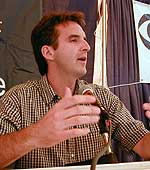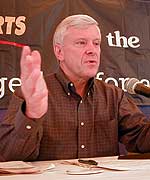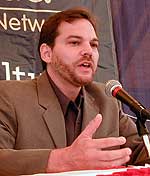By Mark Zdechlik
Minnesota Public Radio
August 7, 2002
The four major party endorsed candidates for governor were back at the debate table Wednesday. This time the focus was on agriculture and rural issues, and the site was Farmfest near Redwood Falls in southwestern Minnesota.
| |
|
|
|
||
Under a large tent packed with spectators, DFLer Roger Moe, Republican Tim Pawlenty, Independent Tim Penny and Green Party candidate Ken Pentel took questions from a panel of farm journalists.
To bolster agriculture in the state, Pawlenty and Moe talked about keeping taxes down, and making sure state regulatory agencies are helping farmers, not standing in their way.
Moe said bad farming practices by a few shouldn't lead government agencies to make it more difficult for other farmers to comply with environmental laws.
Pawlenty said regulators need to change their approach from adversarial to educational.
"We've got to make sure that the MPCA and the Department of Agriculture, and in some cases the DNR, are working together to support and encourage farmers to solve problems in a constructive, positive way," Pawlenty said,
| |
|
|
|
||
"So that the first reaction and attitude of the MPCA is not to come out to your farm and say, 'gotcha.' If they have a problem or a concern, let's work together with farmers to try to solve the problem and not put them in a fine situation."
Moe, Pawlenty and Penny also said the University of Minnesota and its Extension Service could do more to work with farmers, not only on conventional farming issues but in developing new opportunities. Penny and Pawlenty cited the rapidly-emerging field of biotechnology as an example.
Pentel said the best way to bolster farm operations would be to downsize agriculture. Pentel advocates getting away from global trade, for example, and instead encouraging farmers to bypass agribusiness by selling locally.
"The vision I have for the state of Minnesota - in dairy, let's say in particular - reduce the costs. I believe the healthiest, the strongest, most enduring plans for dairy farming and farming in general will lead us toward sustainable organic farming that's based on local, small production that sells from farmer directly to consumer," Pentel said. "The best we can get the huge corporate interests out of the way, I think we then need to establish a new vision for the state of Minnesota."
| |
|
|
|
||
Pentel said global trade is sucking money out of Minnesota that could be used for things like universal health care. Pentel called his opponents' records on trade "spooky," and disconnected from their rhetoric about reviving rural Minnesota.
"I'm for free and fair trade and that's not spooky," Tim Pawlenty responded. "I think being against free and fair trade is kooky."
Penny then scolded Pawlenty for name-calling. He also promoted the idea of adding value to Minnesota-produced crops by processing them locally into finished products.
"This trade thing is no small matter. I am not into referring to those who oppose free trade as kooky...because I think the debate deserves better than that," Penny said. "I think here in rural Minnesota we all understand how much of our grain goes overseas into that world market. That's a big part of farm income here in rural Minnesota. Even in the world market - just as in the domestic market - the best option for us is to send processed goods into that world market, and we need to process those goods closer to where they're grown and we can do that."
On revitalizing rural Minnesota while constrained by the tight state budget, the candidates talked about the need to improve roads and bridges.
| |
|
|
|
||
Moe and Penny, however, criticized Pawlenty's call for a multi-billion dollar bond issue to finance upgrades over a long period of time, saying the state should instead consider tax increases.
Pawlenty said rural schools could benefit if the state moved away from its current method of allocating education money based on enrollment.
"Having these formulas based exclusively just on the number of pupils you have is, I think, outdated," said Pawlenty. "In many of these towns and communities, shutting down a school - if you only have one grade school or one middle school - isn't an option."
Pawlenty also promoted tax-free zones and investment tax credits, among other things, to help diversify rural Minnesota's farm economy.
Moe criticized Pawlenty's no new taxes pledge, saying the Republican's position will leave property taxpayers holding the bag when state funds fall short of spending demands.
"I'm going to focus on making sure that all areas of our state economy improve," Moe said. "That's why I've been emphasizing a homegrown energy policy, making sure we have a transportation system that meets the needs of all parts of this state, particularily rural parts. That's a key and vital link to our economic growth."
The 90-minute debate produced unanimous agreement in only one area - all four say the state should mandate a certain percentage of fuel used in Minnesota should contain crop-based mixtures, such as biodiesel and ethanol.
The Green Party's Ken Pentel says it makes economic as well as environmental sense.
"I'm tired of seeing Minnesota send $7 billion to $10 billion outside the state to buy coal, oil, uranium, gas and big hydro," Pentel said. "We can become our own energy-producing state, and farmers should finally get in on the mix on that."
Pentel qualified his response by saying the state needed to look to an array of alternative energy, not exclusively toward fuels from crops.
Republican Tim Pawlenty said the implications of encouraging ethanol and biodiesel production reach beyond the state's boundaries.
"This is not only good agricultural policy, it's good energy policy, it's good international policy," Pawlenty said. "If this fuel is going to come out of the ground, I'd rather have it come out of the ground in greater Minnesota than in Saudi Arabia."
Roger Moe said helping to establish Minnesota's ethanol industry is one of the accomplishments he's most proud of as a state lawmaker.
"I firmly believe that we have a whole, new emerging area called agri-energy in this state. We can capitalize on that," said Moe.
Tim Penny said in cases like ethanol and biodiesel production, it's entirely appropriate for the government to help establish markets.
"Think of all the industries in America that have been benefited by some government decision at some time. Think of all the Pentagon-related industries cropping up on our coasts - north, south and west. It's because the government made a decision that we needed certain things and propped up certain industries," Penny said.
More from MPR



